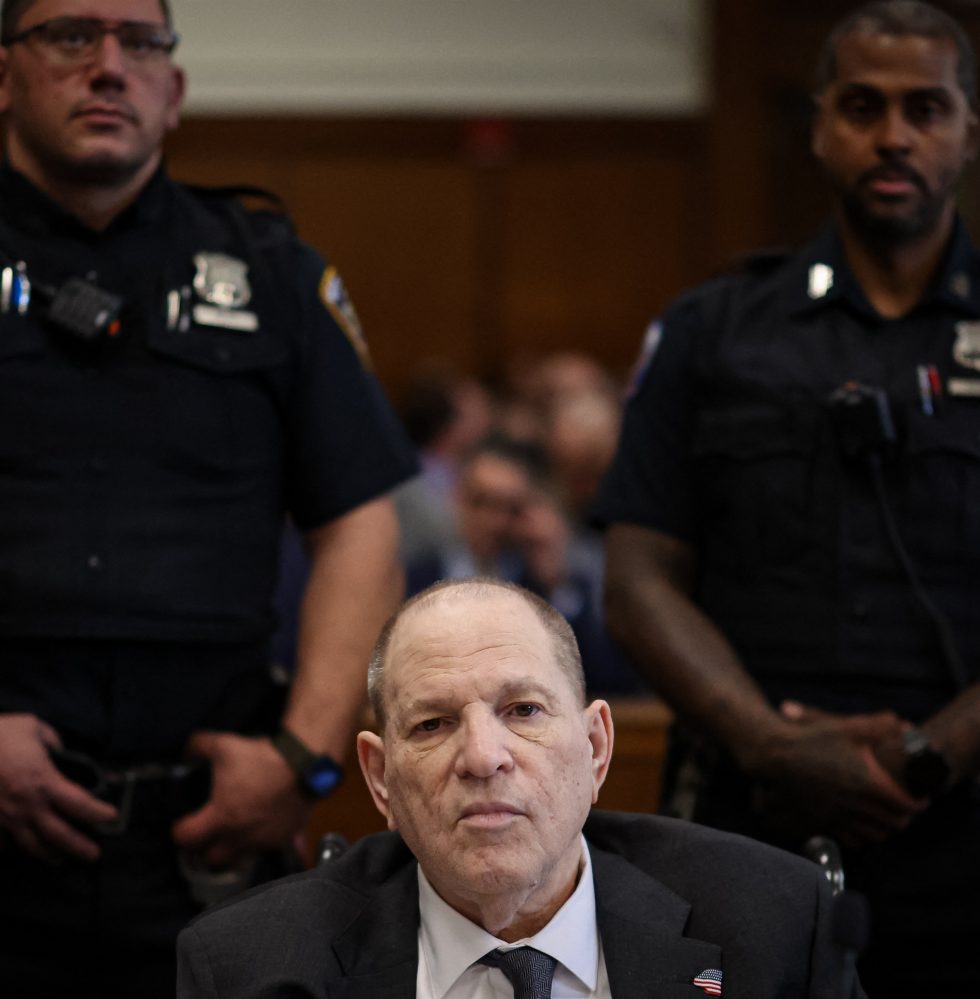
UPDATED, 2:15 PM: In less than 24 hours, the New York jury in Harvey Weinstein’s rape retrial will begin deliberations.
In all likelihood, the seven-woman, five-man panel could be behind closed doors by mid-morning East Coast time to decide whether the once-swaggering producer will be sitting in a state prison cell for the rest of his days. The defense concluded its long closing argument earlier Tuesday, and now the prosecution has just a bit more to go in its final pitch to the jurors.
Whether it takes less or more to reach a verdict than the five days it took the jury in Weinstein’s now-dismissed 2020 New York sex crimes trial remains to be seen.
Earlier today, defense lawyer Arthur Aidala told a Manhattan jury that Weinstein’s accusers chose to portray consensual sex with the Miramax boss as rape and assault because doing so allowed them to collect settlement money from Weinstein. He tossed in that the trio of women at the center of this trial and others sought to further their personal ambitions with accusations after their careers in film and TV didn’t pan out.
Delivering the defense team’s closing argument in Weinstein’s rape and sexual assault retrial, Aidala spent this morning and afternoon seeking to push his argument by discrediting the testimony of Jessica Mann, Miriam Haley and Kaja Sokola. “They’re all women with broken dreams,” he said. “They’re all women who wanted to cut the line.”
In Aidala’s telling, all three sought fame and fortune that other people achieve through hard work by instead cultivating consensual sexual relationships with the media mogul. “They’re using him,” Aidala said. “They’re using their youth, their beauty, their charm, their charisma, to get stuff from him.”
Assistant Manhattan District Attorney Nicole Blumberg followed Aidala late in the afternoon and countered that it was Weinstein who left his victims broken, and shattered their dreams of a life in the entertainment industry, by raping them. “Each woman felt paralyzed and confused and scared” and “blamed themselves for their own choices and their own actions,” and “buried their trauma as if nothing had happened to them,” Blumberg told jurors.
Blumberg spoke for about an hour today and will resume the prosecution’s closing arguments Wednesday morning. The jury will receive instructions afterwards from Judge Curtis Farber and then go huddle for deliberations.
Aidala, for his part, struck a sometimes jovial tone with jurors Tuesday, mimicking witness testimony, using exaggerated gestures and telling his own story of going bald while in law school to elicit laughs from jurors and from his client. Next to him, a blow-up of a photo of a younger, smiling Weinstein and his then-wife, Georgina Chapman, stood on an easel facing jurors.
Playing to the crowd, the showman Aidala compared the prosecution’s case to a vat of pasta sauce with pieces of a broken wine glass in it. In that context, the defense lawyer cautioned, the only safe thing to do so that no one gets hurt is to throw out the sauce.
With Manhattan District Attorney Alvin Bragg, looking on from the gallery, Blumberg put Aidala’s antics on display and told jurors, “This is not a circus — or it should not have been. It’s not a comedy show, It’s not a personality contest.”
“We’re here to talk about the evidence in this case,” she said.
Blumberg said that evidence shows the power Weinstein wielded to make careers, produce movies and have them lavished with awards had another purpose. “He also used that same power to isolate women, to trap women into places where he’d be alone with them, and to rape them,” she told the jury.
The Assistant DA added that Weinstein’s victims showed courage by coming forward, knowing their motives and actions would be dissected on the stand in a way that is unique to rape cases, where accusers are often made to feel as if they’re being put in trial.
“That’s not fame,” Blumberg said. “Nobody wants that.”
PREVIOUSLY, 8:25 AM: Harvey Weinstein is one step closer to learning his fate in his New York rape retrial.
After a Tuesday morning session in front of Judge Curtis Farber spent haggling over material that might or might not go to the jury (it won’t), Weinstein’s Arthur Aidala-led defense rested its case — without calling its client to testify on his own behalf. Moving deftly, the proceedings now are in closing arguments, with Aidala pleading Weinstein’s merits before the jurors.
Closing arguments from the defense and the Manhattan District Attorney’s office are expect to go on for a few hours, but the plan is the jury will have the case by the end of today. At that point, the seven-woman, five-man panel will go behind closed doors to deliberate their verdict.
Weinstein, the 73-year-old once-powerful producer, likely would spend the rest of his life behind bars if the jury convicts him on any of the three charges against him.
Back in 2020, in Weinstein’s later-dismissed first New York rape case, the jury took about five days to come to a verdict of guilty on two of five counts: third-degree rape and a first-degree criminal sexual act. In March of that year, an openly shocked Weinstein was sentenced to 23 years in state prison by the now-pink-slipped New York Supreme Court Judge James Burke.
In this retrial, while the single count of third-degree rape Weinstein faces carries a maximum sentence of four years, each first-degree criminal sexual act count carries a maximum sentence of 25 years. Accused of assaulting numerous well-known actresses and models over the decades, prosecutors in the most benign way say Weinstein used his power and influence as an Oscar-winning producer and mini-studio boss to lure young women into his orbit. Offering what almost always were false promises of work and careers in film and television, they say Weinstein then often violently raped them or forced them into other unwanted sexual encounters.
Fronted by the flamboyant Aidala, Weinstein’s defense has sought to prove that the relationships between Weinstein and his accusers were long-running, consensual and mutually exploitive — a “friends with benefits” arrangement, as Aidala said in opening arguments, where sex was traded for access to Weinstein’s professional network.
Jurors in the rape and sexual assault retrial heard from two accusers, Jessica Mann and Miriam Haley, who also testified in graphic detail against Weinstein five years ago in his first New York criminal trial. A third accuser testifying in the retrial, Kaja Sokola, was not part of the 2020 case: Sokola’s accusation that Weinstein assaulted her in a Manhattan hotel room in 2006 was the basis of a new charge — first-degree criminal sexual act — added to a revised grand jury indictment of the Pulp Fiction producer.
Prosecutors secured the indictment in September, five months after Weinstein’s 2020 conviction and 23-year sentence were overturned in April. A New York Court of Appeals ruled Burke had deprived the defendant of a fair trial by allowing uncharged testimony from other women who told jurors that Weinstein had sexually abused them.
“The court compounded that error when it ruled that defendant, who had no criminal history, could be cross-examined about those allegations as well as numerous allegations of misconduct that portrayed defendant in a highly prejudicial light,” according to the 4-3 ruling.
Weinstein did not testify at his first trial either. The potential hazards of a wide-ranging cross examination were apparently a factor in his decision over the weekend to also not take the stand at the retrial. “He wanted to testify, and we respect that instinct,” Weinstein’s longtime spokesperson Juda Engelmayer told Deadline on Monday. “At this stage, doing so would subject him to scrutiny far beyond the scope of the current charges — raising issues that could unfairly damage his credibility. Our position is one of caution, not evasion.”
Weinstein remains in custody in New York because of his 2022 criminal conviction in Los Angeles. He is appealing that conviction and 16-year prison sentence for raping and assaulting a woman, identified only as Jane Doe, in 2013.
Weinstein has denied ever committing rape or coercing anyone sexually. In a jailhouse interview last month with right-wing commentator Candace Owens, he said: “I swear that before God and the people watching now and on my family. I’m wrongfully accused. But justice has to know the difference between what is immoral and what is illegal.”
Since this retrial started in late April, the ailing Weinstein has shuttled between a downtown Manhattan courthouse and the jail wing of a nearby hospital, Bellevue. Citing his various ailments, as he has in previous trials at pivotal points, the former producer has lobbied hard to stay out of New York’s infamous Rikers Island jail, telling Farber the conditions there are life-threatening. Farber decided in the first week of the retrial to allow Weinstein to stay at the historic hospital during the proceedings.
On the subject of his medical needs, Weinstein underwent emergency heart surgery in September and was diagnosed with cancer in October.



